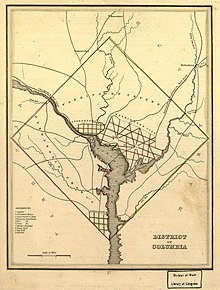Philip Lee (valet)
With fundraising publicity organized by Custis, businessmen Arthur Tappan, Richard Varick, and Eleazar Lord, and ministers Ralph Randolph Gurley and Samuel Hanson Cox, New Yorkers and people of the District of Columbia donated the $1,000 necessary to purchase Lee's wife, and his seven children under 11 years old, thus saving them from being sold south."[1][4] He was also a nephew of William Lee (who had served as General Washington's body man during the American Revolutionary War), a cousin of Christopher Sheels, and the grandson of Old Doll.[3] Lee was described as "mulatto" and his association with the aforementioned servants of General Washington provided him with some measure of social capital, which allowed him access to people and places that were typically off-limits to slaves.[13] The Baltimore American Farmer newspaper published a letter written by Custis from Arlington:[14] Dear Sir, I have read in your last number an inquiry for opossums, to send to La Grange."[5] Custis allowed him to do this and seems to have participated in the publicity, suggesting that Philip Lee was what has been called a "key slave," who was especially trusted by his enslaver and granted an unusual degree of both responsibility and freedom.[10] Philip Lee himself is quoted as saying, "If you can procure the sum of $500 in New-York, you may, and I desire that you would, take them all to the north, and own them and make them serve in payment as long as your laws will allow.'"[1] In a column about the plight of Nelly and the children, Presbyterian minister Samuel Hanson Cox wrote:[1] [Lee's] character is one of extraordinary excellence; of unqualified and universal praise.For a gifted and original mind, regularity and industry, an exemplary influence among those of his own class, jointed with intelligent and consistent piety towards God and man, it in presumed that he has few superiors, of any complexion, on the globe.If it can be obtained, the present owner has humanely pledged himself (and a formal reserve in the contract authorizes the averment on his part), to give them free to their husband and father.[16][17][18] Philip Lee's story was mentioned in the Genius of Universal Emancipation abolitionist newspaper in January 1830, in a regular column called "The Blacklist.The above facts forcibly remind me of the case of Philip Lee, the son of Washington's servant, and the bursting of his grief in anticipation of that time, which, but for the interposition of friends, would have separated him forever from his wife and seven beloved children...Ten thousand, in the technics of the country, 'picked hands,' selected one here and another there!"[21] The tent in question was huge, required three people to set up, was decorated in "laurels and honeysuckle," and on this occasion was "pitched in front of City Hall by the First Division of the New York State Artillery unit.He evinces no disposition, that I can see to do wrong in any sense...I consider Philip the greatest sufferer...of his own responsibility and agency...All I want is that right should be done to all parties…If you can come to a decision about that, my dear husband, it ought not to be delayed.







Arlington National CemeteryMount VernonVirginiaGeorge Washington Parke CustisGeorge WashingtonRobert E. LeeVirginia opossumsMarquis de Lafayetteslave tradersArthur TappanRichard VarickEleazar LordRalph Randolph GurleySamuel Hanson Coxdower slavesWilliam LeeAmerican Revolutionary WarChristopher Sheelssocial capitalphaëtonPhiladelphiaLiveryretrocessionMason's IslandAlexandria CountyMartha WashingtonEleanor (Nelly) Parke Custis LewisArlington HouseGeorge HadfieldTreasury BuildingDistrict of Columbia City Hallbroad wifewild turkeysopossumsBaltimoreGeneral LafayetteVirginia opossumRev. Mr. GurleyColonization SocietySlavery in the District of ColumbiaTheophilus FreemanSolomon NorthupPaul Giamatti12 Years a SlaveGenius of Universal EmancipationBenjamin LundyWilliam Lloyd Garrisonfamily separation in American slaveryNorfolkWashington's BirthdayMaria Carter SyphaxArianna CarterShadow familychildren of the plantationVisit of the Marquis de Lafayette to the United StatesLee familyFirst Families of VirginiaHistory of slavery in VirginiaSlave trade in the United StatesLundy, Benjamin F.Slavery in the colonial history of the United StatesHistory of VirginiaAngelaHenry Box BrownAnthony BurnsJohn CasorEmanuel DriggusOlaudah EquianoIsabella GibbonsWilliam D. GibbonsJohn GraweereElizabeth Key GrinsteadJane WebbMary and Anthony JohnsonDangerfield NewbyJohn PunchGabriel ProsserWilliam TuckerNat TurnerBooker T. WashingtonWashingtonJeffersonMadisonMonroeJohn ArmfieldCarter BraxtonLandon CarterRobert "King" CarterRobert Carter IIIThomas Roderick DewAndrew HunterRobert M. T. HunterEppa HuntonRichard Bland LeeWilliam MahoneGeorge MasonJames M. MasonJohn PageThomas ProsserRandolph family of VirginiaWilliam Barton RogersGeorge Henry ThomasJohn WaylesHenry A. WiseSeth WoodroofPlantationsBeall-AirBerry HillBrookfieldKenmoreMonticelloMontpelierMount Airyenslaved peopleOatlandsPoplar ForestShirleyStratford HallTuckahoeWestoverWoodlawnList of plantations in VirginiaSlave pensBruin's Slave JailThe CageFranklin and Armfield Office